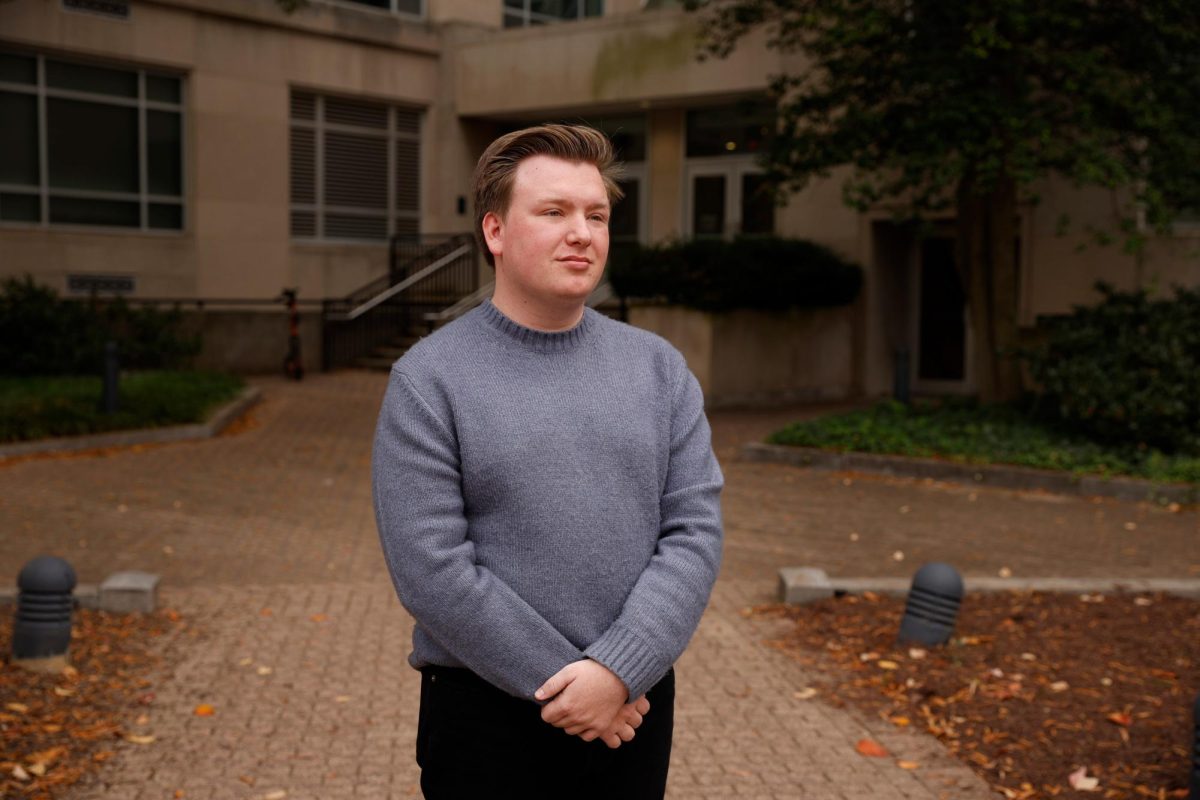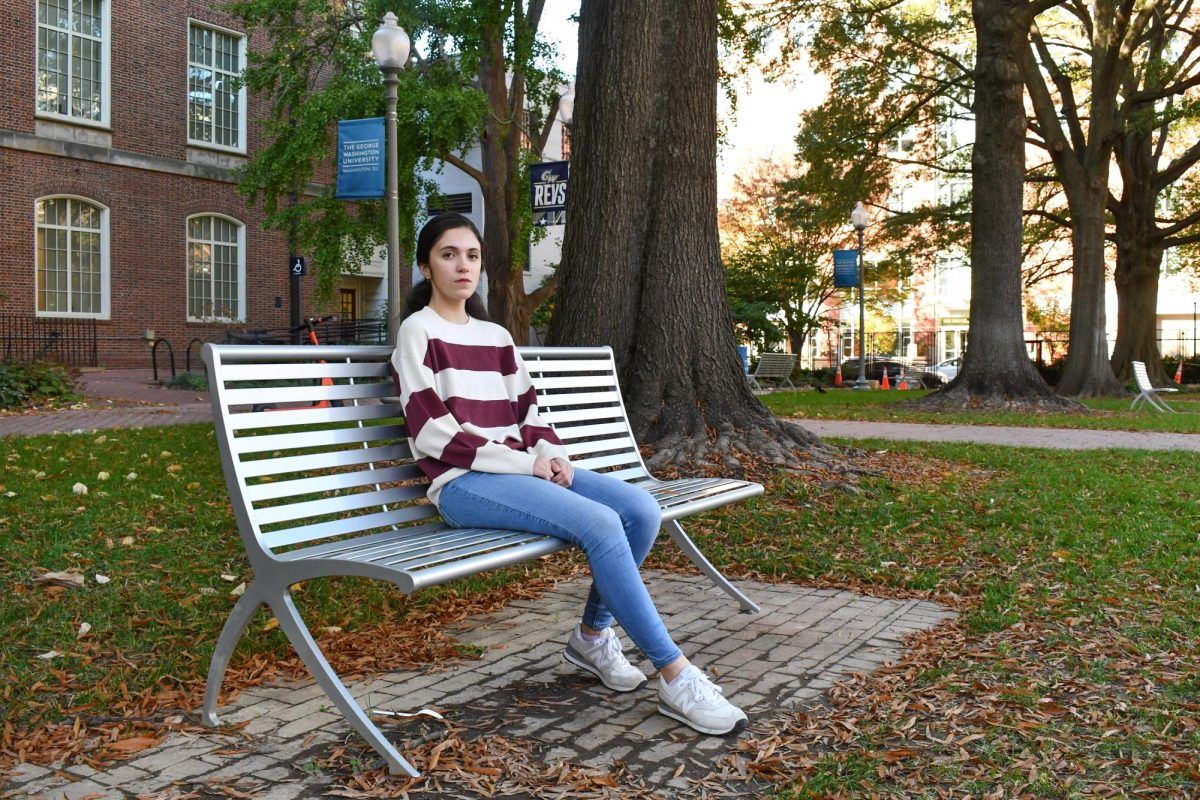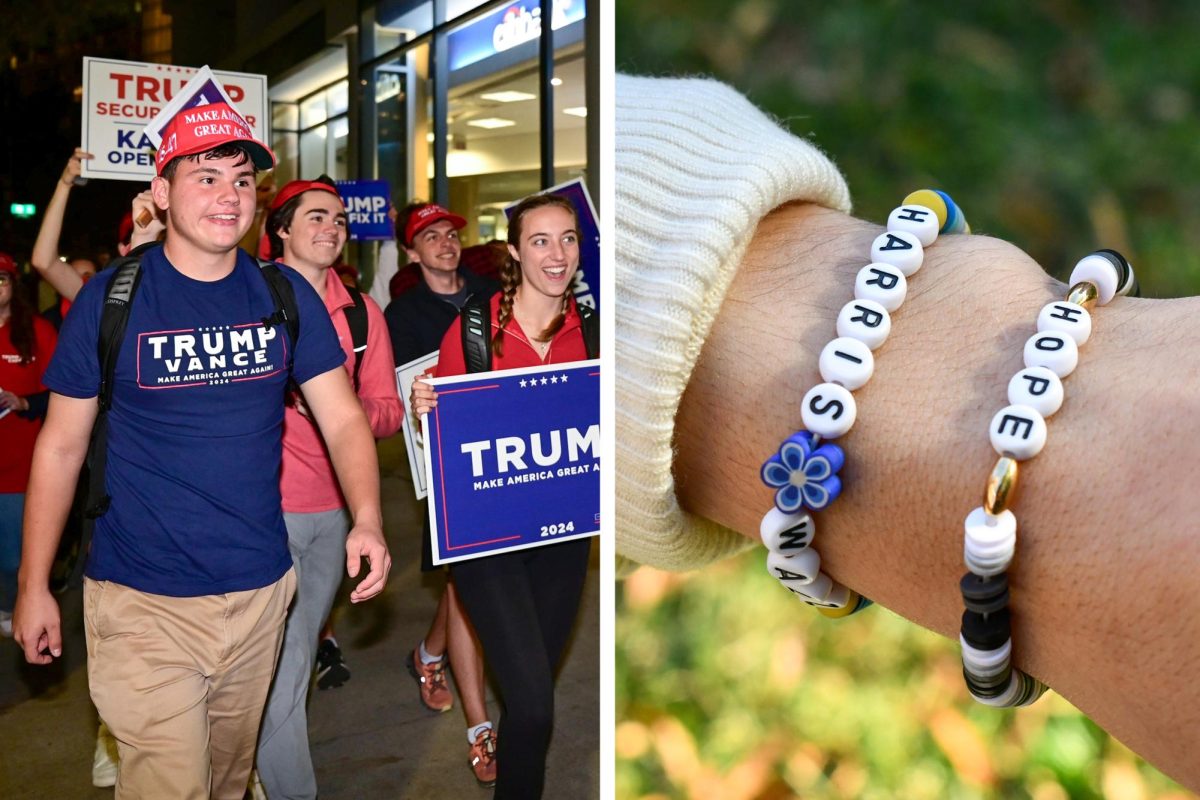Less than 12 hours after polls closed on Election Day, news outlets began declaring Donald Trump the nation’s 47th president.
Blocks away from the White House, some GW students celebrated the Republican Party’s victory while many others grappled with their disappointment and fear of Trump winning a second term in the Oval Office. More than 20 students said they were surprised by the former president’s sweeping victory, with some hoping his economic policies will lower costs and others worrying he will threaten democracy, citizens’ financial stability and reproductive rights.
Trump centered his campaign on immigration and the economy, agenda items that appeared to resonate with the majority of Americans as the former president secured a victory in the electoral college and the popular vote, breaking down the “blue wall” and winning all seven battleground states.
First-year Max Schwartzman watched the election results filter in late Tuesday night at the GW College Republicans watch party in the University Student Center Amphitheater, which he said was full of “excitement” all night.
“It was just so electric,” Schwartzman said.
When Trump clinched the election early Wednesday morning, Schwartzman said GW Republicans celebrated with a late-night march to the White House and then to the National Mall, during which they wore Trump hats and carried signs.
Schwartzman said he expects Trump will lower prices that have climbed during President Joe Biden’s term, when the country faced a peak inflation rate of 9.1 percent in 2022 that settled to 2.4 percent in September.
Trump has pledged to slash gas and grocery prices, boost oil and gas production and rescind any unspent funds from Biden’s Inflation Reduction Act, a $750 billion climate law backed by the Biden administration.
“I’m very excited about that because my wallet hates what’s happening right now,” he said.
Ahead of the election, Republican students praised Trump’s promises to curb inflation and close the southern border, despite some favoring challengers in the party’s primaries. Trump will enter the White House with a Republican majority in the Senate, with election results for the House of Representatives still being tallied but nearing a GOP majority.
Junior Victoria Carlson, the GWCR’s chairwoman, said the watch party lasted until 4 a.m. and reached a 50-person peak, adding that people became more “rowdy” when Sen. Deb Fischer (R-NE) won a third term in the Senate, securing a Republican majority in the upper chamber minutes after midnight.
Carlson said she is hopeful Trump’s presidency will lower costs for Americans and tighten up the borders to minimize drug trafficking and crime in the United States. Trump has promised the biggest mass deportation of migrants in U.S. history, to seal the southern border and stop the “migrant invasion.”
“One of the big questions that he would ask around his whole campaign is ‘Do you feel like you’re better off today than four years ago?’” Carlson said. “And a lot of people for them, the answer is no, and those are the people that ended up voting for Trump.”
She also noted that Trump is one of few presidents in modern history whose term was not marked by the inception of a foreign war. Republican students said last week that they were hopeful Trump’s strongman approach to foreign policy could usher in a respite in the violence between Russia and Ukraine and Israel and Hamas.
“Hopefully we’ll see some peace,” Carlson said.
The energy at GW College Democrats’ simultaneous watch party in the student center Tuesday night started hopeful, with the roughly 150-person crowd buzzing with anticipation for a potential Kamala Harris presidency, according to GW Democrats Chief of Staff Logan Olszewski.
But between 11 p.m. and midnight, attendees began to “see the writing on the wall” and disappointment swept through the room when news outlets began projecting Trump’s victory, Olszewski said. He said he felt like the organization’s recent campaign efforts on the ground, like canvassing in battleground states like Pennsylvania, didn’t work after the state went red for the presidency.
“I thought she was the needed change for the country, and obviously, the country disagreed,” Olszewski said.

Olszewski said he’s worried that Trump could threaten democracy by putting political appointees in bureaucratic positions who serve his personal interests instead of those outlined in the U.S. Constitution. The co-chair of Trump’s presidential transition team promised to bring in loyalists to lead the federal government after high turnover and infighting among senior leadership in Trump’s first term.
But watching Harris’ concession speech Wednesday at Howard University revitalized his optimism, Olszweski said. Harris’ speech to supporters at her alma mater that day came after she canceled her election-night speech as Trump’s victory became apparent.
He said young people who will graduate under Trump’s presidency shouldn’t let his leadership dissuade them from working in bureaucracy.
“It won’t be easy, but I am confident that we will weather this storm,” Olszweski said.
Junior Emily-Anne Santiago, the programming director for GW College Democrats from Florida, said Trump’s second win against a female candidate shows that the nation doesn’t believe a woman should be in power. She said she plans to pick up a second job because she is worried that Trump’s agenda, which proposes eliminating the Department of Education, will put at risk her Free Application for Federal Student Aid, which she relies on to pay tuition.
Santiago said as a Puerto Rican, she is worried that the rights of the U.S. territory, which lacks full voting representation and some federal benefits, will erode under Trump’s administration. She said she was disappointed in the Latino voter turnout for Trump — as he received about 45 percent of Latino votes, a 13 percent increase from 2020 — adding that the voting bloc chose the prospect of economic gain over the risk of deportation.

“Yeah, your eggs might be cheaper, but at what cost? If your family members are being deported, if your friends are being deported,” Santiago said. “I always say jokingly, but who knows, that he would sell Puerto Rico for a donut. You know what I mean? He doesn’t care about us. Truly.”
Senior Ellie Morar said she is worried as an upcoming graduate about entering the workforce because Trump plans to impose tariffs on imported goods and retract independence from the Federal Reserve, which controls the nation’s interest rates and has historically been an independent agency.
“It’s scary that we have to navigate the world in our, in the beginning of our really adult lives in this time where we don’t really know what’s gonna be going on or know what’s happening,” Morar said. “It could go south really fast.”
Senior EJ Tennant, the president of Foggy Bottom Plan B and the resource and action chair for GW Reproductive Autonomy and Gender Equity, said she at first felt fear and sadness regarding Trump’s win, but she is now “rolling her sleeves up in rage” because she foresees Trump will continue “criminalizing women’s pregnancies.”
In his last presidency, Trump took credit for overturning Roe v. Wade — which revoked a constitutional right to abortion and triggered prosecutions for stillbirths in some states — but it’s unclear if he intends to enact a national ban on abortion once back in office. Students who voted for Harris said last week that they opposed Trump in part because of his unclear stances on abortion.
Tennant added that Foggy Bottom Plan B, an organization providing free and emergency contraception, is preparing for potential “crackdowns” on access to Plan B and abortion clinics in the District since the Republican-led Congress will have authority over the city come January. Trump said in May that he was open to restrictions on contraceptives but then backed away from the statement.
“It will harm reproductive health. It will harm health in general. It will harm a lot of different things. I can go on forever,” Tennant said.
Jennifer Igbonoba contributed reporting.





